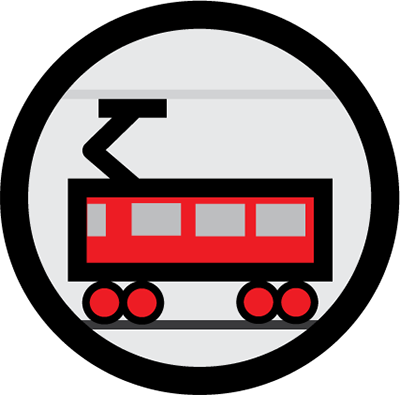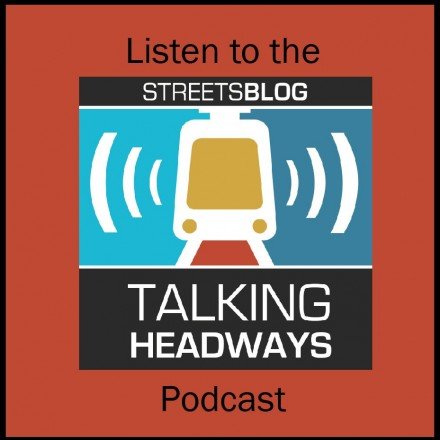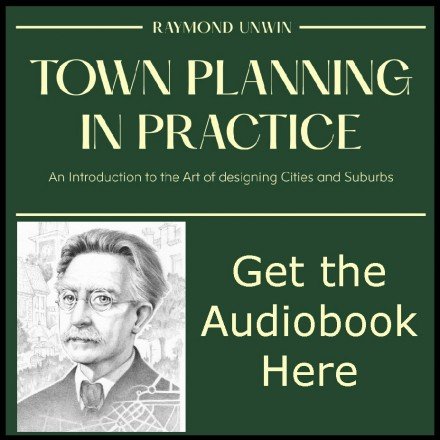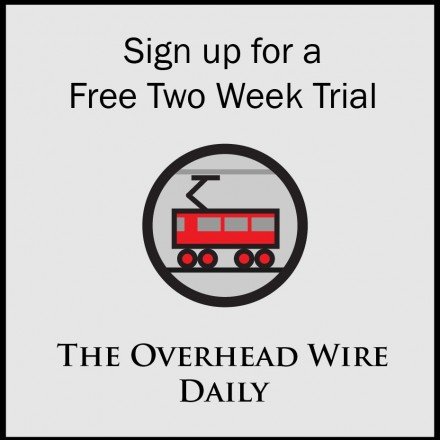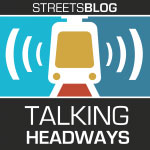(Unedited) Podcast Transcript 367: Reimagining Sustainable Cities
This week we’re joined by Tina Rosan, Associate Professor at Temple University and Stephen Wheeler, Professor at UC Davis to talk about their new book Reimagining Sustainable Cities: Strategies for Designing Greener, Healthier, More Equitable Communities. We talk about a broad array of topics including rethinking public meetings, urban power dynamics, and structural change in government systems.
You can find the audio of the show on Streetsblog USA or our Libsyn host page.
Below is a full unedited transcript.
Jeff Wood (43s):
Steve Wheeler and Tina Roseanne. Welcome to the Talking Headways
Stephen Wheeler (1m 12s):
Podcast. Thank you so much for having us
Jeff Wood (1m 15s):
Well. Thanks for being here before we get started. Can you tell us a little bit about yourself? We’ll start with Tina and then we’ll go, Steve next.
Tina Rosan (1m 20s):
Sure. So I am a associate professor in geography and urban studies at temple university. I have a master’s and a PhD in urban planning, and I have done a lot of research on urban sustainability and climate and governance issues.
Stephen Wheeler (1m 40s):
And I try to be an activist academic that is I wasn’t activist for many years before I went back to grad school. I worked in DC with the organization, friends of the earth, and then I worked in the bay area with a group called urban ecology, which took a very holistic approach to sustainable cities. And finally, I decided grad school was worthwhile and I wound up teaching at UC Davis where I am in professor, actually in the landscape architecture program. Although I am not a landscape architect, I teach urban design and sustainable development.
Jeff Wood (2m 16s):
We might’ve been in the same building for a certain amount of time in downtown Oakland. When I was at reconnecting America, we were at the old historic central building. Is that where you had your office?
Stephen Wheeler (2m 24s):
It was like 14th and Broadway. I can’t remember the name of the building. Yeah.
Jeff Wood (2m 29s):
Yeah. I think we were in the same building. That’s funny crossing paths many years later. How did you all get into cities? Like what was the thing that kind of sparked your interest? Was it something that happened when you were younger or did it kind of develop over time? What was the impetus for interest?
Tina Rosan (2m 44s):
Well, I grew up in Brooklyn, so I sort of feel like I am like the Sesame street generation. So my parents were both urban planners. My dad’s an architect and I, you know, I’ve always loved being from New York and just, I guess I never really understood places that were not urban because I had spent so much time in cities. And then when I went to college, I ended up going to college in the middle of nowhere. And I think for me, that really cemented my interest in cities. So I’ve, yeah, I’ve sort of never left. So I’m in Philly now and I think there’s so much possibility in the city and it’s such an exciting place and I’ve always been a real optimist about this is our future.
Stephen Wheeler (3m 34s):
And I grew up in suburban, Massachusetts, and I saw this wave of tidal wave of suburbia, just taking over the entire Eastern half of Massachusetts that seemed, and it wasn’t just subdivisions. There was a lot of what we would now call rural sprawl, you know, houses sort of tucked here and there, but taking away any sort of wild quality and socially, I saw a whole lot of very lonely people and very disconnected people and very dysfunctional families, mine own of course being included. But it just was clear that this wave of suburbanization was not working for a lot of people. Then later I was working in DC on the nuclear arms race.
Stephen Wheeler (4m 17s):
And I decided eventually that I wanted to spend my life doing something positive earlier than trying to stop bad things from happening. So, you know, having sustainable and livable cities and equitable cities seems like a positive vision for the future. So that attracted me
Jeff Wood (4m 35s):
Well that dovetails into the book. I mean, Reimagining Sustainable Cities Strategies for Designing Greener, healthier, More Equitable Communities. How did you all get together to start working on this? You’re on different coasts. That’s always an interest interesting to me to hear how people, you know, get the idea for a book and then kind of come together to put something on the paper.
Tina Rosan (4m 50s):
Steve and I were on a lot of panels together at the HCSP, which is the association of collegiate schools of planning conference. And I think both of us were frustrated that the framing of sustainability wasn’t broad enough and people weren’t asking like tough enough questions. So initially we, we actually tied up the book asking radical questions about sustainability, but, you know, as the term radical became radicalized, we sort of, we weren’t radical enough or we were too radical. So we just thought, you know, we’re going to write this book that is about kind of that you could use in your classes, in your sustainable cities classes.
Tina Rosan (5m 33s):
That would answer a lot of the questions and that it wouldn’t be just wholly depressing, which is like a lot of the box. And it would sort of kind of frame it in a broad term.
Stephen Wheeler (5m 43s):
And our original idea was to write the most non-academic book possible and to have it be fun and, you know, upbeat and very accessible and lots of images and stuff like that. And of course being academics, the footnote sort of crept back in a little bit, but we, we did try to minimize them and make a, you know, a reasonably uplifting and very accessible read, giving people ideas about ways that things could be different. And speaking in particular to younger people, you know, because we have to think, you know, what’s the end of the century going to be like, what’s the next century you’re going to be like, how can we get excited about the future in contrast to all the gloom and doom that’s out there?
Jeff Wood (6m 31s):
Well, that was something interesting that I noticed as well, is that you all mentioned that you wanted it to be used in classes, but I think it could be used for city councils and for other folks who are interested in learning what the possibilities are of different strategies, different ideas. There’s so much in here. I mean, most of the time when I’m putting together questions for a book, there’s, you know, one thread of a topic that goes through the whole book and it’s a specific topic and it is very close, but this there’s so many topics. Actually. I had a hard time kind of organizing my thoughts because there’s so many topics. And I think that that’s actually good from the standpoint of it shares so much information about so many different things. And it’s not just kind of pigeonholed in one, one section. Did you actually kind of put that thought into the book when you’re writing it?
Jeff Wood (7m 11s):
I mean, thinking about just like you already mentioned that you kind of did, but I want to kind of understand more about how putting so much into the book kind of opens people’s minds
Stephen Wheeler (7m 21s):
Well in cities and towns, everything fits together. And we also take a theoretical approach known as social ecology, which likewise argues that many different dimensions of our world fit together. And that we have to be aware of those interactions in order to really get things done and develop better paths for the future. So we tried to get enough detail on every one to be interesting, to a whole range of readers. And we tried to point out the ways that things do fit together. It’s not easy. And the problem with some of the more right-wing visions out there is that they are much simpler and more linear.
Stephen Wheeler (8m 6s):
And it’s more challenging to get our heads around the interconnections of current systems, but that’s really, what’s kind of needed in the long run.
Tina Rosan (8m 15s):
I would say we definitely had hoped that the book would not just be used in classes. If you think about the book like Steve and I both teach sustainable cities classes. So we had a bunch of questions that people are kind of always asking us, like, you know, how do we get to carbon neutrality? So sort of trying to work through that. But I think what you see in the book, and this is really from Steve a lot is the kind of vast knowledge of just like a whole bunch of stuff going on in the world and trying to figure out how to put that all in one place. Cause that’s what I felt when I teach sustainable cities is, you know, there’ll be a YouTube video here and I know a little case study here, but it’s like just all this little tiny bits of knowledge.
Tina Rosan (9m 4s):
So how do we like craft it into one place? So my sense of the book is like, you know, we sort of want you to get excited about it and then do your own research afterwards and like keep going on the thinking. But it’s really the beginning of sort of a cataloging of like, there is a lot of really cool stuff happening that is pushing against these norms. And like, this is just like the beginning of a way of thinking about that so that, you know, I think the book wants people who are practical to read it and to add their voices to it and to say, oh yeah, we tried that here.
Tina Rosan (9m 44s):
And we want to know more about that. So I think that that’s what is actually fun about the book is that it’s sort of just the beginning of like a slightly more positive conversation. That’s really filled with a lot of examples that come from many years of studying these issues.
Stephen Wheeler (10m 1s):
If I can pick up on that a bit further, there are really interesting examples of communities all over the world doing things differently or that have done things differently. And in the U S particularly we tend to think, oh, we’ve got the right way of doing things here, but we don’t. And we got to learn from history and from the rest of the world. And that process of being more open and learning, I think is where the hope in the future lies the recent book, the Dawn of everything by David Graber and his coauthor is a little bit similar. It takes a different view, anthropologically of human history, you know, going back in particularly archeologically and prehistory, looking at all these interesting experiments that communities did worldwide or societies did as opposed to the linear Western European civilization as the pinnacle of everything model.
Stephen Wheeler (10m 59s):
So anyway, that’s where we were coming from.
Jeff Wood (11m 3s):
You know, you talk in the book about how you feel like we’ve specialized a little bit too much, and I feel like this actually pushes people in another direction to look more at the larger picture. And I think that’s a good, that’s a good thing. And it’s something that I try to do with my newsletter. I mean, I could focus on transportation only, but we talk about, you know, a number of different strategies and a number of different topics, because it’s important to kind of go further out from one silo. It feels like
Stephen Wheeler (11m 27s):
The field of transportation is a great example of that. In the 20th century, it was kind of taken over by the engineering side of things. And there were standards that were laid down by national associations, such as Ash toe, and the streets had to be a certain width and people were locked into a whole bunch of simple goals and ways of designing streets. And then toward the end of the 20th century. And now on the 21st people are realizing, oh, we need a much broader approach. We need to really have designers involved rather in addition to engineers and we need to have things like complete streets, which account for all the user groups out there.
Stephen Wheeler (12m 9s):
And we need to have things like green streets, which have ecological function. And so there has been a vast broadening out and some of the old engineering frameworks are now seen as way too constricting.
Tina Rosan (12m 22s):
And Steve, I think that’s also true if you think about something like green stormwater infrastructure, right in the past, you’d have, you know, some engineers who would just figure out how to get you the clean water and build the pipes. And now we’re asking people to think about, you know, green stormwater management is related to parks and playgrounds, and it’s also connected to gentrification. So we need people who are skilled in the technical, but we also need them to understand the historical on the economic and you know, that the past kind of history that has shaped the urban environment.
Tina Rosan (13m 3s):
And because if you just walk in with your engineering solution and you don’t understand history, you know, you’re not going to get to that equitable place because you don’t understand how complex it is. And I think that is the story that we are trying to tell is that, you know, cities are exciting. They’re also super complicated and they are embedded in a lot of value systems and history and kind of normative ways of thinking. And we actually have to push back on that and imagine something different. And, you know, as an academic, I’ve had people say to me like, oh, Tino, you know, why are you fighting the refinery?
Tina Rosan (13m 43s):
Because we are always going to have a refinery. And I keep asking, well, why, why is it there? Why do I have to have that refinery in my city? You know, is there another way? And I think that’s what is exciting about like being allowed to ask the questions of, and to kind of re-imagine, it does open the possibilities of a different type of future.
Jeff Wood (14m 5s):
And in the book you go outside of the typical transportation and land use San technical ideas to move towards the government side towards thinking about governing systems. I mean, you talk about reform capitalism, social democracy, democratic socialism. Do you think supporters of these types of like systems that you talk about, explain them very well. I found that you all explained them very well. I think maybe I understand them better than I did before. And I felt like I somewhat did understand.
Stephen Wheeler (14m 29s):
That’s wonderful. We appreciate hearing that we are really just beginning those structural change discussions currently in the U S and probably in Britain and other places as well. We are hopefully nearing the end of a wave of populism and neoliberal domination, and we need new models. And so those are starting to come on the scene. We had, you know, people like Bernie Sanders and so forth, articulating things that none of us thought would ever get said in a mainstream election campaign, but we need much more of it. And we need a whole generation of new leaders and we need to, again, to look to other countries like I look to, you know, it’s easy to look to Canada in some ways.
Stephen Wheeler (15m 14s):
Well, the provinces in Canada have the ability to look at a metropolitan area and say, this is not working. All these local governments are fighting each other. This it’s totally fragmented across this whole jurisdictional landscape. We’re just going to change things. We’re going to re amalgamate instead of 49 different local governments. We’re going to have five and they have the power to do that. The provinces statutorily have that power. You know, there are pros and cons of course, to everything, but in the U S we don’t rethink yet that way. And so often we are mired in quicksand to all the local governments, you know, in a Metro region, just looking out for their own self-interest and undercutting one another.
Jeff Wood (16m 3s):
It was a lot like the idea of inertia is we’re stuck with you is actually in the book a lot BAU business, as usual. I’m wondering also what made you kind of think about comparing the business as usual case and inertia to sustainable practices? Because I feel like we’re stuck in the 50 states. We’re stuck in metropolitan areas that are made up of 250 different municipalities and structurally, it seems like it’s not really working very well, but it’s business as usual. So people keep going and going and inertia continues to bring us down this road.
Tina Rosan (16m 35s):
I mean, one of the things I would say is that climate change and COVID are disruptors of business as usual. And, you know, we tend to think that there’s no other way of doing things, but we can see that, you know, you can have conferences on zoom and you can do all of these things that you didn’t think you could do a few years ago and have conversations that are, you know, completely different ways of thinking. So things can change, but you have to be willing to first admit that the current system is creating all these really negative situations and climate change is the epitome of the negative situation.
Tina Rosan (17m 22s):
You know, we’re basically business, as usual is basically going to drown us. And the idea that all these cities are going to be able to sort of use property tax revenues, isn’t going to work anymore when a lot of their land is going to be underwater. And, you know, so, so a lot of the things that kind of allow business as usual to just keep going, I don’t think you’re like, nature’s going to stop that. So it’s not going to be just us. It’s going to be, you know, we are seeing that business as usual is a disaster. And so we need some other options, you know, and it doesn’t mean you have to throw everything out, but it does mean you have to rethink and reimagine and try new things.
Tina Rosan (18m 3s):
And that’s what you see all around the world. People are trying new things and they’re, re-evaluating, you know, is this really the kind of world we want to live in? Is this what we want to leave for our grandchildren? And my, like, you know, why are all these people depressed? What is wrong with the society? So you really have to admit you have a problem and then you can move on. But I think that has been accelerated. The, the problem is coming for us, we’re living in it. We can’t hide.
Stephen Wheeler (18m 30s):
I think all of us are submerged within an ocean of details in our everyday lives. And it’s very hard to figure out what are the paths to a better future. The right in the U S has done a pretty good job of articulating a path forward, a particular scenario, which is neo-liberalism the free quote unquote free market economy and individual freedom and concepts like that. The left has not done that good, a job of articulating alternatives. And so I think all of us need to start doing that more. And we have tried to do that in this book a bit. There is no one particular path, but there are a number of paths that could work.
Stephen Wheeler (19m 13s):
One of them could be something approaching social democracy that has examples in Northern Europe and other places we could go further. We could think about an economy that is not for profit at all, that is based on cooperatives or various sharing models or a de-growth economy, or other things such as that, but spelling these different pathways out, I think is part of the task of the next decade or so
Jeff Wood (19m 39s):
It’s a political book. I’m wondering if you set out to be very political, or if it’s just part of the discussion about sustainable cities and the way that we’re moving towards them,
Stephen Wheeler (19m 49s):
You can’t take politics out of virtually anything. Politics is woven into our lives and into our communities and societies. You know, I think feminism realized that back, you know, a couple generations ago and certainly things like racism are woven into in our political and social inequality. We try to make links between very nuts and bolts changes, okay. The width of his street, or, you know, who has access to a public space or housing, what type of housing programs do we have in a given city or state those nuts and bolts things and, you know, bigger political paradigms or directions.
Stephen Wheeler (20m 30s):
And it’s hard to do that, but, you know, we all can practice that.
Tina Rosan (20m 35s):
Yeah, no, I think it’s interesting that you think it’s political because I thought we sort of tried not to make it too political, but I mean, I think it has a, I mean, and maybe this is the way the right and the left, but there are different views about how we got here and how we get out of it. And I think we see a really strong role for government to help us get out of it. There’s not the faith that somehow, if we just like the private sector role, you know, they’re going to solve climate change for us. So I think one thing that kind of runs through the book is this idea of sort of caring about, you know, can we build a society and cities that actually, you know, take the time to understand the life conditions of people and, and the forces that created them, and then think about what are the ways to, you know, undo them or rebuild communities.
Tina Rosan (21m 28s):
And so you have to be really intentional about that, and maybe that is political, but, you know, I think that that’s also kind of what we owe as people who are involved in shaping places. We need to get to that level of, you know, like, what are we doing this for? And what do we owe citizens and the people we work for, you know, and what kind of places do we all deserve to live in? Yeah. So maybe that’s political. I think of it sort of like more, just, you know, the right thing to do, but, you know,
Stephen Wheeler (21m 60s):
If I can take another crack at that question, we’re not political in the sense of being Democrat or Republican or anything like that. No, but I think we are political in the sense of trying always to look at where power is in cities and towns and societies, and how could we get power and the various interests that exist behind better solutions and develop solutions that benefit everyone, including the least powerful. In addition to those who do have some power,
Jeff Wood (22m 34s):
And that’s something you bring up in the book as well as is equity, intersectionality, thinking about things together that sometimes have been separate. And we talked about this earlier about the connection points between all of it, but there’s also this like spatial inequality. And I was actually really drawn into the story about how, you know, Kentucky and the bay area really aren’t all that different. I’m wondering if you could share a little bit more about kind of those connections that you make between places that seem very different, but are actually very similar in the way that they are inequitable spatially and for people in general,
Stephen Wheeler (23m 5s):
That’s a big topic.
Jeff Wood (23m 8s):
It’s all big topics.
Stephen Wheeler (23m 9s):
Worldwide. We have a lot of winner regions and loser regions or winter communities and loser communities. We have capital that is draining from some places to other places and talent and resources of many types and some of those places. Well, let me use the example of Kentucky where my dad’s family is from. It is, it was a fairly self-sufficient farming culture a hundred years ago when people grew most of what they needed to eat. And according to the family members, I’ve been able to talk to had relatively happy lives.
Stephen Wheeler (23m 50s):
That totally changed in the last century, the global economy undercut rural places like that. And because agriculture in California was subsidized a great deal. It was no longer profitable to grow anything on small farms, you know, on somewhat more marginal land. And people left to go other places. And exploitative industries came in like strip mining for coal and dope growing and stuff like that. And so you’ve had a cycle of downward social trajectory there. And meanwhile, places like Silicon valley, you know, are seen as the global success model.
Stephen Wheeler (24m 32s):
But if you actually drive through Silicon valley, there’s not much to look at. There is no new, big, new cities being developed. There’s just a lot of disconnected, suburban sprawl. There’s no, you know, beautiful plazas and museums and, you know, markets, places, people come together. It’s very atomized and there’s a lot of core people. There’s a lot of people who can’t afford housing. There’s a lot of people who are commuting two and three hours a day to get there because they can’t afford to live. There. There’s a lot of people of color who are being displaced communities like east Palo Alto, which is right next to Palo Alto, which is one of the powerhouses of Silicon valley. You know, it was east Palo Alto was an African American and Japanese immigrant community.
Stephen Wheeler (25m 14s):
And those people are being displaced. So lots of inequity, lots of harm being done. The winners aren’t really winners. We need to rethink this whole model whereby capital drains from some places to other places. And in the end, only a few people win. And most of us lose.
Tina Rosan (25m 34s):
I think the main, the, the sort of level of inequity that Steven was talking about is important to note that, you know, the real concentration of wealth and, you know, people who have everything and kind of don’t even realize that a lot of people don’t have anything. So, you know, we, we live in this world where I was really struck this week, where there was this tweet from the Wharton professor. And then they asked, you know, the Wharton students, how much money, like an average person may X. And they said, you know, six figures. And, you know, so there’s a real disconnect between the winners don’t even understand.
Tina Rosan (26m 16s):
They have no concept of what’s happening in a lot of these places. And that makes us divided, you know, and it hurts us all.
Stephen Wheeler (26m 24s):
And if I can pitch into that again, on a more positive note, I think the vision in the future is communities everywhere that are quite a bit more self-sufficient and produce more stuff both locally and within the broader region, but aren’t importing it from the other side of the world and keep the capital circulating locally. So that residents aren’t forced to move thousands of miles to find a job that pays them what they need. Yes, we will still be connected globally. Yes, we was still, some things will still travel and some people long distances, but much of our lives, we’ll be more focused on particular pieces of land that we will take care of better.
Stephen Wheeler (27m 13s):
And in particular communities, diverse communities that we will steward better and we will understand better. And we will not insulate ourselves from people that are different from us, but we will be a part of a community with them. This sort of more localized vision has been around for quite a while. It has been tried different places, and it’s often been undercut by, you know, the forces of globalization. And we need to be sophisticated about how we pursue it in the future and stop undercutting it and start supporting it.
Jeff Wood (27m 50s):
You’ve all been talking about the book for a little while. I imagine after it was released. I’m curious if there is something about the book that you wish you were asked more about that maybe you don’t get to talk about as much.
Stephen Wheeler (27m 59s):
That’s a really good question for me. I, I just love talking about any part of it. And the only thing I mind is when people just don’t ask anything, we all have to be curious about our future, you know, and our society’s future, our community’s future. And a lot of people have trouble finding the energy for that, which I understand in some ways, but I think we all need to find that energy and engage.
Tina Rosan (28m 26s):
Yeah, no, I mean, I’m happy. It came out pretty recently, sort of the end of I came out in December, 2021. So it’s interesting to see people sort of use it, you know, I’m using it in a class of mine. And I was really excited to hear. One of my students was saying this book made me so happy. I was like, wow. Okay. That’s cool. That’s not what I expected, but that’s awesome. Yeah. So, I mean, I think to me, you know, books take a long time to write and when, by the time they come out, you’re always on to the next thing. So I think that’s the challenge, but I feel like this book sort of has some staying power because it like deals with a lot of, there’s just so much in it that, you know, I think it can stick around for a few years holding the space.
Tina Rosan (29m 17s):
Okay. But, you know, things are changing all the time and our understanding of sustainability a few years from now, you you’ll want to read a different book, you know? So I think it’s just building this knowledge, which is kind of exciting to play some small piece of that.
Jeff Wood (29m 33s):
Or maybe it’ll turn into a pattern language. Like you mentioned a number of times in the book, Christopher Alexander’s long-time book, that folks still reference even today. I think for me, when I was reading it and I’ve covered this stuff fairly frequently, I have a newsletter. We go through 1500 items a day and I cover a lot of different topics in sustainability. And there’s so many topics in here that I don’t think I’d read about, or I hadn’t heard the idea of. And I liked to bring in government into it. I liked thinking about different ways of structuring, you know, governments. I also like the idea of thinking about a land maximum, those types of things that are just ideas that, you know, might get floated around from time to time. But aren’t really articulated as much as just thrown out as kind of an argument at a pool party or something along those lines.
Jeff Wood (30m 16s):
So what I appreciated was just the breadth of the ideas and the thinking outside the box. It wasn’t just the usual suspects as it were. I mean, obviously when I’m on Twitter, I can read folks talking about Henry George, but there’s a lot of folks that, and might not have heard his name or specifically that, that discussion about land capping was really fascinating. So I appreciate that as well. Were there any topics that you all, when you’re researching that you found were new to you?
Stephen Wheeler (30m 41s):
Well, that particular one I, I did find was new to me at the idea that a society could set the maximum amount of land that an individual could own. And multiple nations have done that. Finland, I think probably did it at the most where I think their limit was something around 200 acres and anything over that went back to the common pool. And it seems like a good amount to me. I mean, how much land can one person really use, even if you’re farming it with equipment, you know, you know, we have people who own as much land as entire states, stuff like that we need for the future. If we’re going to think about how do we provide housing for everyone?
Stephen Wheeler (31m 22s):
You know, we have housing crises worldwide right now. It’s not just the U S you know, Canadian cities and Asian cities. And so thinking outside the box is so essential to this particular time in history
Jeff Wood (31m 36s):
At the end, you all discussed the frustration of activism too, which is something I think a lot of people are feeling these days, especially during the pandemic, but you give these four archetypes of activists, visionaries, reformers, organizers, and implementers. I’m curious which ones you all
Stephen Wheeler (31m 50s):
Well for myself, I’ve been all of those at different times. You know, we all wear multiple hats, you know, and part of the thing I work with students around is trying to be strategic in any given situation. What role do we play? How could we get progressive change to happen? Who has the power here? Is this a time when we need a different vision out here is at a time when the vision exists and the goals exist, but nobody’s really implementing them, or we need pressure on a particular part, or we need to change the code in some way, we need to change the nuts and bolts of how this community’s run. Different things are going to come up at different times. Right now, personally, I’m involved in leading an effort at UC Davis to end our fossil fuel use.
Stephen Wheeler (32m 34s):
And so some of that is developing the vision of no fossil fuels in this very large campus. Other, another part was political organizing. Okay, who’s got the power here. Well, the chancellor and a few other people, how do we put pressure on them and developing a coalition to do that, and then meeting with them. And now we’ve gotten them to agree, to develop a plan in the next year to eliminate fossil fuels. Now we have to bulldog that and get into the details of the plan and work with the staff to implement. So there’s different phases of work that occurred at different times and different hats and different people that can come in to do those things.
Stephen Wheeler (33m 14s):
But some of us do have preferred roles in my preferred role is probably on the vision end.
Tina Rosan (33m 19s):
Yeah. I mean, I agree with Steve that there’s a time and place for everything. And one of the things that I like about being an academic is that you can really dig in pretty deep into different topics. And, you know, like just, I’m always interested in the nitty-gritty of like how it works and why didn’t it work and that kind of stuff. But, you know, right now I’m, I’m working on a project to put in purple air monitors in Philly and working with the universities, trying to get them to really sort of counter the city’s air monitoring plans that, you know, would they have 10 monitors that really aren’t capturing the environmental justice concerns of the city.
Tina Rosan (34m 1s):
So really trying to think about, you know, how do we use all these resources that are already out there and capitalize on them and connect with middle schools and stem education and, you know, like public health issues. So, yeah, I mean, I think you have to have the vision of what that is and why you need it, and then you gotta get in there and, you know, people are emailing me, how do I get one of these monitors who’s paying? And, you know, so there are, there are a lot of details that you have to figure out, but I mean, I, I think that the thing is to figure out what you’re good at, you know, and where your strengths are and then roll with it. I mean, one thing that the past few years, particularly since I’ve gotten tenure, you know, I, I’m not afraid to write news articles about how the city should be doing something that they’re not doing.
Tina Rosan (34m 49s):
And that’s, I think that’s the real, you know, ability of being an academic is to be able to ask those questions and push people in different ways because of my job. So I’m gonna, you know, keep doing that work and be as loud as I can.
Jeff Wood (35m 3s):
My last question is about public meetings. There’s a section on creating a more functional democracy and you focus a bit on public meetings. And I’m wondering even after reading your suggestions, such as meeting moderation and participatory forms, if it’s salvageable at all, and maybe what’s the first best step, if it is salvageable, which I think that you would say it is, but sometimes I wonder,
Stephen Wheeler (35m 25s):
That’s a question that comes up frequently and there’s no easy answer. We have a lot of anger and frustration locally amongst citizens among residents. And there’s a big backlog of that. There are a lot of little steps that can help processes move forward, keeping things positive, being constructive, listening well to people rephrasing people’s arguments so that they know they’ve been heard, making sure that one group doesn’t dominate the meeting, keeping things short and constructive and focused on goals. There are skills of facilitation that are very important for us to, or particularly those of us involved in public meetings to practice.
Stephen Wheeler (36m 11s):
But there’s, there’s no quick shortcut. We need to build trust. We need to build back social capital, which has been eroded in this country a lot. And in many countries we need leaders who build trust to help us learn who set out visions that we can understand, and that will allow us to get over the real work that we’re going to have to do to get there. I don’t know if I’m answering your question very well, but it is one of the most fundamental, how do we get out of this very fractious place that we’re in as a society?
Tina Rosan (36m 47s):
A lot of the work that I’m doing now is with community groups in north Philadelphia, and that, you know, somebody said to me, you know, and I don’t know who to attribute this to. So it’s not me, but said, you know, collaboration moves at the speed of trust. And so, you know, people say, what have you been doing? You know, you, you met with all these people like through zoom. We’ve been having these community meetings and talking, just really listening to people about what they want. And what occurs to me is that, you know, our public participation process is often about asking people what they don’t want and people have to fight so hard just to be heard.
Tina Rosan (37m 29s):
And I think part of it is that allowing people who have traditionally been denied that power to shape, what’s important to them and to define that and then giving them voice, you know, so we have some really interesting in Philly, we have this citizen planning Institute where, you know, citizens learn how to be planners and really kind of making the sort of tools of re-imagining the future and visioning accessible to people who are typically on the receiving end of, of a lot of negative stuff. So how do we get those people who really have been trained in the trenches of participation, but in a really they’ve had a bad experience, how do we take their interest in shaping their communities and flip that?
Tina Rosan (38m 13s):
So we start to listen to them. I actually think there’s so many new roles for technology and, you know, re-imagine it like my kids are on roadblocks all the time building and Minecraft and, you know, so like the new generation they’re already, you know, so technologically savvy and understand sort of the possibility. And I think part of it is we kind of have to stop just showing up with a bunch of baked projects and asking people to, you know, what do you think about it? We need to like show up way earlier and have a real discussion about what are your current conditions? How do we improve them? You know, what are the challenges, climate, all these other things.
Tina Rosan (38m 55s):
So I definitely think there’s a lot of work that we can already do, but in the future, we’re going to also have to just totally rethink public participation. That’s a growth area. I would say, you know, looking for good smart people to help fill that out.
Stephen Wheeler (39m 12s):
Let me try to take a historical perspective also to this question very quickly. In the middle of the 20th century, we had planners designers, policymakers, who often didn’t consider the public at all and who just made decisions. And we had programs like urban renewal, which bull does an entire neighborhoods with huge racial and social equity destruction. And then we had 50 years of gradual inclusion, which for the most part has been really important. And we have had lots of public process that has developed to get that inclusion happening.
Stephen Wheeler (39m 52s):
Every city holds lots of workshops and public meetings and design charettes and you name it around any plan or any big policy change. Well, that was good to a certain extent, but it often didn’t address the underlying power dynamics who really had power in that place and was going to make decisions in the end. So people were still frustrated. And if you have all these endless series of public meetings, you burn people out, you burn both the ordinary citizens and you burn the staff out. And, and in the end, you wind up with just those people that are the angriest or the, at the biggest stake in the given issue.
Stephen Wheeler (40m 33s):
And it’s not really democratic at all. Plus there are some constituencies that you will never get in a public meeting. Future generations by definition are not going to be represented. And the natural world is not going to be represented unless somebody takes out on themselves. Many undocumented individuals or many groups in society are not going to be represented. Even if you try your best to get them to turn out. So we’re at the point of needing a new paradigm of public engagement, where we do have some process, but it’s thorough but limited. And we have good inclusion and everybody adopts the mindsets of including these other groups that are never going to be there.
Stephen Wheeler (41m 15s):
And we do address the underlying power imbalances and we build a trust. So how exactly that’s going to happen? I couldn’t tell you, but I think we’ve got to go in that direction.
Jeff Wood (41m 25s):
Well, they can start by reading your book, Reimagining Sustainable Cities, Strategies for Designing Greener, healthier and More Equitable Communities. Where can folks find it if they want to get a copy?
Stephen Wheeler (41m 34s):
Well, any independent bookstore can order it for you and independent online booksellers. I like powells.com myself, but there are others I would suggest not using Amazon. Amazon has had lots of detrimental effects on local communities running local bookstores out of business, for example, but I am sure that you can find an independent bookseller online who can get it for you.
Jeff Wood (41m 58s):
Yeah. We, we usually tell folks to go to bookshop.org. If you can’t get to your local book seller and click on the local bookseller, that’s closest to you, that’s affiliated with them so that you can pick up the book. I’ve done that a number of times, and even, you know, my mine is folio books here in San Francisco and I order through them pretty frequently. So thank you all for coming on the show. We really, really appreciate your time. And thanks for a great book. I will say for folks, this is a really thick book of information and awesome knowledge. There’s land management to personal responsibility, functional democracies, to natural systems that you cover. The gamut of things. We just kind of scratched the surface a little bit like a lottery ticket, almost the little parts that come off because there’s so, so much depth to this. And I really appreciate your work on it. And thanks again for coming on the show.
Stephen Wheeler (42m 39s):
Thank you so much for having us
